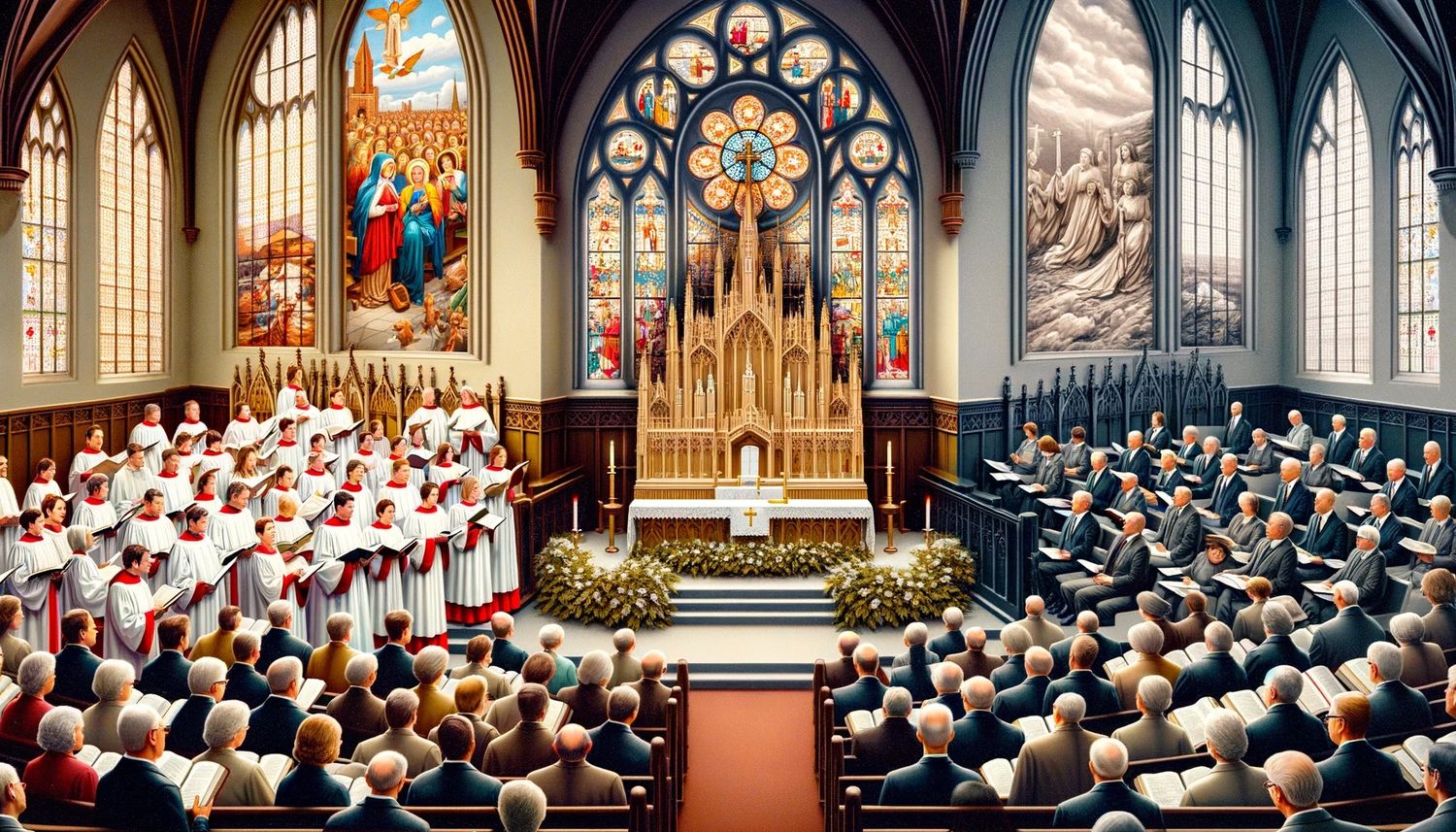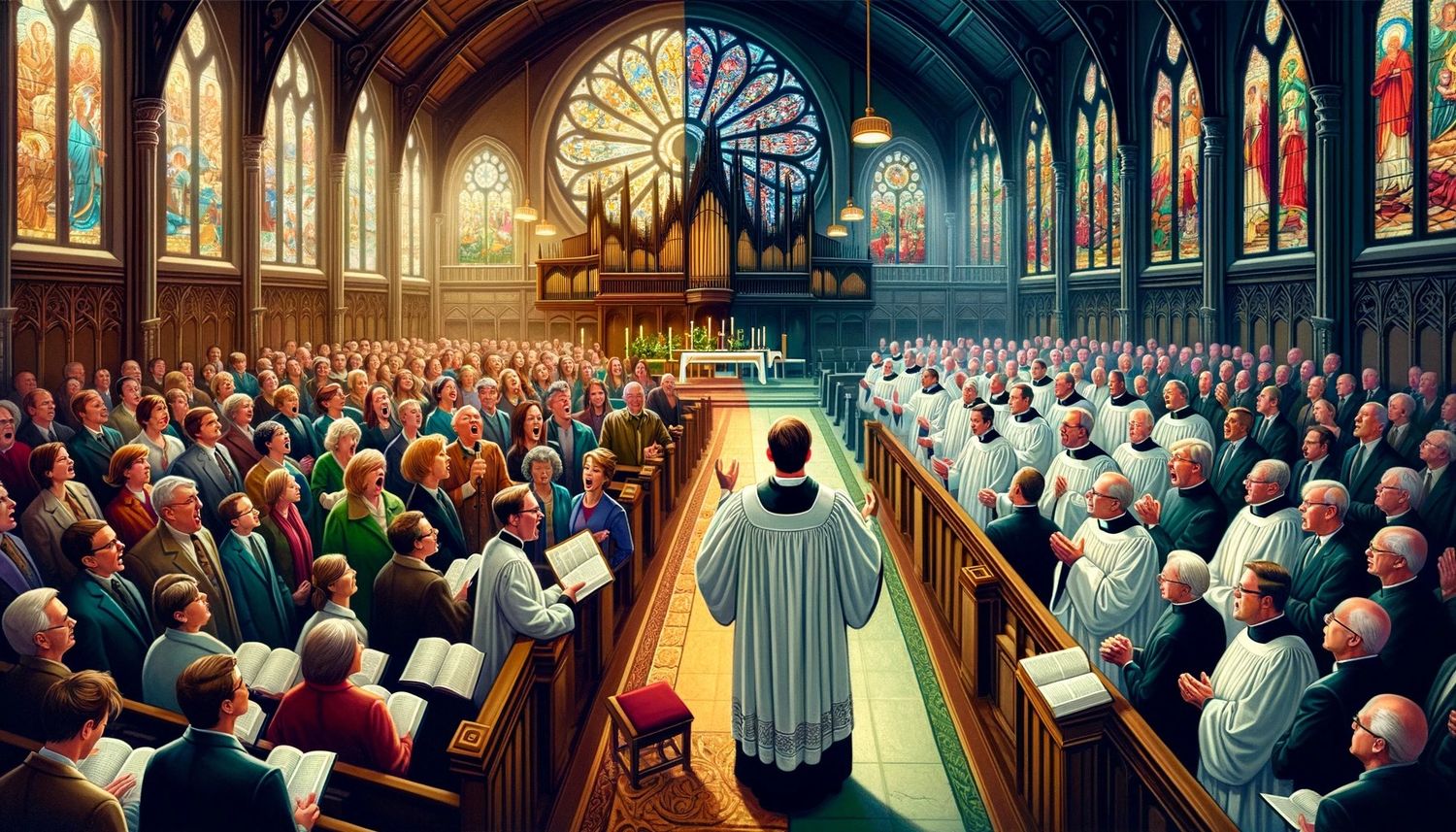Home>Theology and Spirituality>What Is The Difference Between Lutheran And Presbyterian Religions


Theology and Spirituality
What Is The Difference Between Lutheran And Presbyterian Religions
Published: March 3, 2024
Jason DeRose, Managing Editor at Christian.net, uses his expertise in religion and journalism to deepen understanding of faith's societal impacts. His editorial leadership, coupled with a strong academic background, enriches the platform’s diverse content, earning him recognition in both journalism and religious circles.
Discover the key distinctions between Lutheran and Presbyterian religions in terms of theology and spirituality. Explore their beliefs, practices, and historical backgrounds.
(Many of the links in this article redirect to a specific reviewed product. Your purchase of these products through affiliate links helps to generate commission for Christian.net, at no extra cost. Learn more)
Table of Contents
- Overview of Lutheran and Presbyterian Religions
- History and Origins of Lutheran and Presbyterian Religions
- Beliefs and Practices in Lutheran and Presbyterian Religions
- Differences in Church Structure and Governance
- Comparison of Sacraments and Worship Styles in Lutheran and Presbyterian Religions
- Role of Clergy and Leadership in Lutheran and Presbyterian Churches
- Influence of Reformation and Theology in Lutheran and Presbyterian Religions
Overview of Lutheran and Presbyterian Religions
Lutheranism and Presbyterianism are two distinct branches of Protestant Christianity, each with its own unique history, beliefs, and practices. While both traditions share some commonalities, they also have significant differences that set them apart. Understanding the key characteristics of Lutheran and Presbyterian religions can provide valuable insights into the diverse landscape of Christian faith.
-
Distinct Denominations: Lutheran and Presbyterian churches are separate denominations within Protestantism, each with its own theological perspectives and organizational structures.
-
Reformation Roots: Both traditions trace their origins to the Protestant Reformation of the 16th century, which was a period of religious upheaval and reform in Europe. Martin Luther, a German theologian, played a pivotal role in the development of Lutheranism, while John Calvin, a French theologian, significantly influenced the emergence of Presbyterianism.
-
Doctrinal Emphases: Lutheranism places a strong emphasis on the teachings of Martin Luther, particularly his doctrine of justification by faith alone. In contrast, Presbyterianism is characterized by its adherence to the theological insights of John Calvin, including the concept of predestination and the sovereignty of God.
-
Worship and Liturgy: While both traditions prioritize the preaching of the Word and the celebration of the sacraments, they may differ in their approaches to worship styles and liturgical practices. Lutherans often maintain a more structured liturgical form, while Presbyterians may exhibit greater flexibility in their worship services.
-
Global Presence: Lutheran and Presbyterian churches have established a global presence, with congregations and denominational bodies found in various countries around the world. This global reach has contributed to the diverse expressions of these traditions within different cultural contexts.
-
Theological Diversity: Within both Lutheran and Presbyterian traditions, there exists a spectrum of theological perspectives and practices. This diversity can be observed in the ways individual congregations and regional bodies interpret and apply their respective theological traditions.
Understanding the overview of Lutheran and Presbyterian religions provides a foundational understanding of the distinct characteristics and historical developments that have shaped these two significant branches of Protestant Christianity.
History and Origins of Lutheran and Presbyterian Religions
The history and origins of Lutheran and Presbyterian religions are deeply rooted in the Protestant Reformation, a transformative movement that reshaped the religious landscape of Europe in the 16th century. Martin Luther, a German monk and theologian, is widely regarded as the key figure in the establishment of Lutheranism. In 1517, Luther famously protested against the Catholic Church's sale of indulgences by nailing his Ninety-Five Theses to the door of the Castle Church in Wittenberg, sparking a wave of theological and ecclesiastical reforms. This event marked the beginning of the Reformation and the eventual formation of the Lutheran tradition.
Meanwhile, in Switzerland, the teachings of John Calvin gave rise to the Presbyterian tradition. Calvin, a prominent Reformer, emphasized the sovereignty of God, predestination, and the authority of Scripture. His theological insights and ecclesiastical principles laid the foundation for the development of Presbyterianism, which took shape in Scotland and later spread to other parts of the world.
The historical contexts in which these traditions emerged significantly influenced their theological emphases and organizational structures. Lutheranism, with its emphasis on justification by faith and the priesthood of all believers, became closely associated with the German territories and later expanded to other regions. In contrast, Presbyterianism, characterized by its emphasis on the governance of the church by elected elders (presbyters), gained prominence in Scotland and found expression in various Presbyterian denominations across the globe.
The historical trajectories of Lutheranism and Presbyterianism reflect the complex interplay of theological, political, and cultural factors during the Reformation era. As these traditions took root and developed over time, they became distinct denominational expressions within Protestantism, each with its own rich history and enduring legacy. Understanding the historical origins of Lutheran and Presbyterian religions provides valuable insights into the diverse tapestry of Christian faith and the enduring impact of the Protestant Reformation.
Beliefs and Practices in Lutheran and Presbyterian Religions
-
Justification and Salvation: In Lutheran theology, the concept of justification by faith alone holds central importance. Lutherans believe that individuals are justified, or made righteous in the eyes of God, solely through faith in Jesus Christ, apart from any merit of their own. This emphasis on grace and faith as the means of salvation distinguishes Lutheran beliefs. On the other hand, Presbyterian theology also upholds the significance of faith in Christ for salvation, but it is often accompanied by a strong emphasis on God's sovereignty and predestination, reflecting the influence of John Calvin's teachings.
-
Sacraments: Both Lutheran and Presbyterian traditions recognize the sacraments of baptism and the Lord's Supper (also known as the Eucharist or Holy Communion). In Lutheranism, the sacraments are viewed as means of grace, conveying God's forgiveness and strengthening the faith of believers. Lutherans affirm the real presence of Christ in the Eucharist, though the precise understanding of this presence may vary among different Lutheran bodies. In Presbyterianism, the sacraments are celebrated as acts of remembrance and spiritual nourishment, emphasizing the symbolic significance of these rituals within the life of the church.
-
Church Governance: The organizational structure of Lutheran and Presbyterian churches differs significantly. Lutheranism often features a more hierarchical system, with bishops or regional synods providing oversight and leadership. In contrast, Presbyterianism is characterized by a representative form of government, where elected elders (presbyters) collectively govern the church at the local, regional, and national levels. This distinction in governance reflects varying interpretations of how the church should be organized and governed according to each tradition's theological principles.
-
Role of Scripture: Both traditions hold the Bible as the authoritative and foundational source of Christian faith and practice. Lutherans affirm the principle of sola scriptura, meaning "Scripture alone," as a guiding tenet of their theological convictions. Similarly, Presbyterianism emphasizes the primacy of Scripture in shaping doctrine and guiding the life of the church. The interpretation and application of biblical teachings may vary within each tradition, influenced by historical, cultural, and theological factors.
-
Worship Styles: While both traditions value the proclamation of the Word and the celebration of the sacraments, they may exhibit differences in worship styles and liturgical practices. Lutherans often maintain a liturgical worship tradition, characterized by formalized rituals and a structured order of service. In contrast, Presbyterian worship services may display greater flexibility, allowing for diverse expressions of worship within the framework of Reformed theology.
-
Theological Diversity: Within Lutheran and Presbyterian traditions, there exists a spectrum of theological perspectives and practices. This diversity can be observed in the ways individual congregations and regional bodies interpret and apply their respective theological traditions. While certain core beliefs and practices are shared across these traditions, the nuances of theological interpretation and ecclesiastical practice contribute to the rich tapestry of Lutheran and Presbyterian expressions of faith.
Understanding the beliefs and practices in Lutheran and Presbyterian religions provides valuable insights into the distinctive theological emphases, worship practices, and ecclesiastical structures that shape these two significant branches of Protestant Christianity.
Differences in Church Structure and Governance
-
Lutheran Church Structure: Lutheranism often features a hierarchical system of church governance. This structure may include bishops or regional synods that provide oversight and leadership at various levels of the church hierarchy. The role of bishops in Lutheran churches varies, with some traditions emphasizing the historical episcopate, while others adopt a more synodical approach to governance. The Lutheran understanding of church structure is influenced by historical developments and theological considerations, reflecting a balance between centralized leadership and regional autonomy within the broader Lutheran communion.
-
Presbyterian Church Governance: In contrast, Presbyterianism is characterized by a representative form of government, known as presbyterian polity. This system of governance is based on the rule of presbyters, or elders, who are elected to provide leadership and decision-making within the church. At the local level, congregations are governed by elected bodies known as sessions, which consist of ruling elders and teaching elders (ministers). These sessions are further connected to presbyteries, regional governing bodies composed of ministers and elders, and ultimately to a general assembly at the national level. The emphasis on shared leadership and accountability among elected presbyters distinguishes Presbyterian church governance.
-
Distinctive Organizational Principles: The differences in church structure and governance between Lutheranism and Presbyterianism reflect distinctive organizational principles and theological emphases. While Lutheran churches may exhibit a more centralized leadership model with varying degrees of episcopal oversight, Presbyterian churches prioritize the collective discernment and decision-making of elected presbyters at multiple levels of the church hierarchy. These structural differences shape the ways in which decisions are made, leadership is exercised, and the broader church community is engaged in matters of faith and practice.
-
Ecclesiastical Authority: The question of ecclesiastical authority is central to the differences in church structure and governance between Lutheran and Presbyterian traditions. In Lutheranism, the role of bishops or regional synods may carry significant authority in matters of doctrine, discipline, and church administration. This hierarchical framework reflects a historical continuity with pre-Reformation ecclesiastical structures, albeit with distinct theological emphases. In Presbyterianism, the authority is vested in the collective discernment of presbyters, who govern the church through representative decision-making and mutual accountability. The emphasis on shared leadership and the participation of the whole church community in governance distinguishes the ecclesiastical authority within Presbyterian churches.
-
Theological Implications: The differences in church structure and governance have theological implications for each tradition. Lutheran church structure may reflect a nuanced understanding of the relationship between local congregations and broader regional or national bodies, while Presbyterian governance emphasizes the interconnectedness of congregations within a broader network of presbyteries and general assemblies. These structural differences are informed by theological convictions about the nature of the church, the exercise of authority, and the discernment of God's will within the community of believers.
Understanding the differences in church structure and governance provides valuable insights into the organizational principles, leadership models, and ecclesiastical authority that shape the distinct expressions of Lutheran and Presbyterian traditions within the broader landscape of Protestant Christianity.
Comparison of Sacraments and Worship Styles in Lutheran and Presbyterian Religions
Sacraments
Lutheran Tradition
In the Lutheran tradition, sacraments hold a central place in the life of the church. Lutherans recognize two sacraments: baptism and the Lord's Supper (Holy Communion). These sacraments are viewed as means of grace, conveying God's forgiveness and strengthening the faith of believers. The sacrament of baptism is celebrated as the entry into the Christian community, marking the individual's incorporation into the body of Christ. The Lord's Supper, often referred to as the Eucharist, is regarded as a sacred meal in which the real presence of Christ is believed to be spiritually present, offering nourishment and sustenance to the participants. The Lutheran understanding of the sacraments emphasizes the tangible ways in which God's grace is communicated to the faithful through these rituals.
Presbyterian Tradition
Similarly, the Presbyterian tradition recognizes the sacraments of baptism and the Lord's Supper as integral aspects of worship and spiritual formation. Baptism is understood as a sign and seal of God's covenant, symbolizing the washing away of sin and the new birth in Christ. The sacrament of the Lord's Supper is celebrated as a commemoration of Christ's sacrificial death and a means of spiritual nourishment for the community of believers. Presbyterians emphasize the symbolic significance of these sacraments, viewing them as acts of remembrance and spiritual renewal within the life of the church.
Worship Styles
Lutheran Tradition
In the Lutheran tradition, worship styles often reflect a structured and liturgical approach, characterized by formalized rituals and a prescribed order of service. Liturgical elements such as the use of liturgical texts, hymnody, and responsive readings are commonly integrated into Lutheran worship. The celebration of the sacraments, particularly the Eucharist, holds a central place in Lutheran worship, often accompanied by a rich musical tradition and a sense of reverence for the sacred elements of the service. The Lutheran liturgical tradition emphasizes the proclamation of the Word and the participation in the sacraments as essential components of worship.
Presbyterian Tradition
Presbyterian worship styles may exhibit greater flexibility, allowing for diverse expressions of worship within the framework of Reformed theology. While some Presbyterian congregations may follow a more traditional or liturgical form of worship, others may incorporate contemporary elements such as praise music, multimedia presentations, and participatory forms of worship. The emphasis on the centrality of Scripture, the preaching of the Word, and the celebration of the sacraments remains foundational in Presbyterian worship, but the specific style and format of worship services may vary across different congregations and regional bodies.
Diversity and Unity
While there are distinct differences in the understanding and practice of sacraments and worship styles between Lutheran and Presbyterian traditions, both traditions share a common commitment to the spiritual nourishment of the faithful through the sacraments and the proclamation of the Word in worship. The diversity of worship practices within each tradition reflects the rich tapestry of expressions that contribute to the unity of the broader Christian community. Understanding the comparison of sacraments and worship styles in Lutheran and Presbyterian religions provides valuable insights into the distinctive ways in which these traditions engage in worship and spiritual formation within their respective ecclesiastical contexts.
Role of Clergy and Leadership in Lutheran and Presbyterian Churches
Lutheran Tradition
In the Lutheran tradition, the role of clergy and leadership is shaped by a combination of historical precedent and theological conviction. Lutheran clergy, including pastors and bishops, are ordained to serve as ministers of Word and Sacrament, entrusted with the pastoral care of congregations and the administration of the sacraments. The Lutheran understanding of the priesthood of all believers emphasizes the shared responsibility of clergy and laity in the life of the church, with clergy serving as servants of the Word and stewards of God's mysteries. Pastors in Lutheran churches are called to proclaim the Gospel, administer the sacraments, provide spiritual guidance, and equip the congregation for ministry. Bishops, where present, may provide oversight and pastoral leadership at the regional or national level, ensuring the unity and mission of the church within the broader Lutheran communion.
Presbyterian Tradition
In Presbyterian churches, the role of clergy and leadership is characterized by a commitment to shared governance and mutual accountability. Ministers, ruling elders, and teaching elders collectively exercise leadership within the church, guided by the principles of representative government and the discernment of the whole church community. Ministers of Word and Sacrament are called to preach the Word, administer the sacraments, and provide pastoral care to the congregation. Ruling elders, elected by the congregation, share in the leadership and decision-making of the church, while teaching elders (ministers) are responsible for the proclamation of the Gospel and the administration of the sacraments. Together, these ordained leaders collaborate in the discernment of God's will, the governance of the church, and the equipping of the saints for ministry.
Distinctive Emphases
The role of clergy and leadership in Lutheran and Presbyterian churches reflects distinctive emphases on the priesthood of all believers, the ministry of Word and Sacrament, and the shared governance of the church. While Lutheran clergy are called to serve as ministers of Word and Sacrament, upholding the centrality of the sacraments and the proclamation of the Gospel, Presbyterian clergy and elders collaborate in a system of shared leadership, guided by the principles of representative government and mutual accountability. These distinctive emphases shape the ways in which clergy and leadership function within the ecclesiastical contexts of Lutheran and Presbyterian churches, embodying the diverse expressions of ministry and leadership within the broader landscape of Protestant Christianity.
Understanding the role of clergy and leadership in Lutheran and Presbyterian churches provides valuable insights into the distinctive models of pastoral ministry, shared governance, and spiritual leadership that shape these two significant branches of Protestant Christianity.
Influence of Reformation and Theology in Lutheran and Presbyterian Religions
The influence of the Protestant Reformation and its theological underpinnings has profoundly shaped the development and distinct characteristics of Lutheran and Presbyterian religions. Both traditions emerged in the wake of the Reformation, drawing from the theological insights and ecclesiastical reforms that defined this transformative period in Christian history. The theological legacies of Martin Luther and John Calvin, along with the broader Reformed tradition, continue to inform the beliefs, practices, and organizational structures of Lutheran and Presbyterian churches, reflecting enduring commitments to the principles of sola scriptura, justification by faith, and the priesthood of all believers.
Reformation Roots
The Protestant Reformation, ignited by Martin Luther's critique of the Catholic Church's teachings and practices, laid the groundwork for the emergence of Lutheranism as a distinct theological tradition. Luther's emphasis on the authority of Scripture, the doctrine of justification by faith alone, and the priesthood of all believers became foundational tenets of Lutheran theology. These theological emphases reflected a commitment to reforming the church according to the principles of the early Christian community and the teachings of the apostles, setting the stage for the development of Lutheran beliefs and practices.
Similarly, the Reformed tradition, influenced by the teachings of John Calvin and other Reformers, contributed to the theological foundations of Presbyterianism. Calvin's emphasis on the sovereignty of God, predestination, and the authority of Scripture shaped the theological distinctives of Presbyterian theology, emphasizing the absolute sovereignty of God in all aspects of human life and the necessity of aligning with God's will as revealed in Scripture. These theological emphases, along with the ecclesiastical reforms advocated by Calvin, informed the development of Presbyterian beliefs and practices within the broader Reformed tradition.
Doctrinal Emphases
The doctrinal emphases of the Reformation, including the principles of sola scriptura (Scripture alone) and sola fide (faith alone), continue to exert a profound influence on Lutheran and Presbyterian theology. Lutheranism's commitment to the primacy of Scripture as the authoritative source of Christian faith and practice, coupled with its emphasis on justification by faith, reflects the enduring impact of the Reformation's theological insights. Similarly, Presbyterian theology's adherence to the authority of Scripture and its emphasis on the sovereignty of God and predestination are rooted in the theological convictions of the Reformed tradition, shaping the distinctive doctrinal emphases of Presbyterian beliefs.
Church Governance and Authority
The influence of the Reformation is also evident in the ecclesiastical structures and governance models of Lutheran and Presbyterian churches. Lutheranism's historical connection to the episcopal tradition, with its emphasis on the role of bishops and synods in church governance, reflects a nuanced response to the ecclesiastical structures inherited from the pre-Reformation era. In contrast, Presbyterianism's commitment to representative government and shared leadership, guided by the discernment of presbyters at multiple levels of the church hierarchy, reflects the influence of the Reformed tradition's emphasis on the priesthood of all believers and the collective discernment of the church community.
Theological Diversity and Unity
While Lutheran and Presbyterian traditions exhibit theological diversity and distinct ecclesiastical expressions, they share a common heritage rooted in the theological and ecclesiastical reforms of the Protestant Reformation. The enduring influence of the Reformation and its theological legacy continues to shape the beliefs, practices, and organizational structures of Lutheran and Presbyterian churches, contributing to the rich tapestry of Protestant Christianity. The theological diversity within each tradition reflects the ongoing dialogue and interpretation of Reformation principles within diverse cultural and historical contexts, while the shared commitment to the foundational insights of the Reformation underscores the unity of these traditions within the broader landscape of Christian faith.
Understanding the influence of the Reformation and theology in Lutheran and Presbyterian religions provides valuable insights into the enduring impact of this transformative period in Christian history, illuminating the theological distinctives and ecclesiastical expressions that define these two significant branches of Protestant Christianity.












